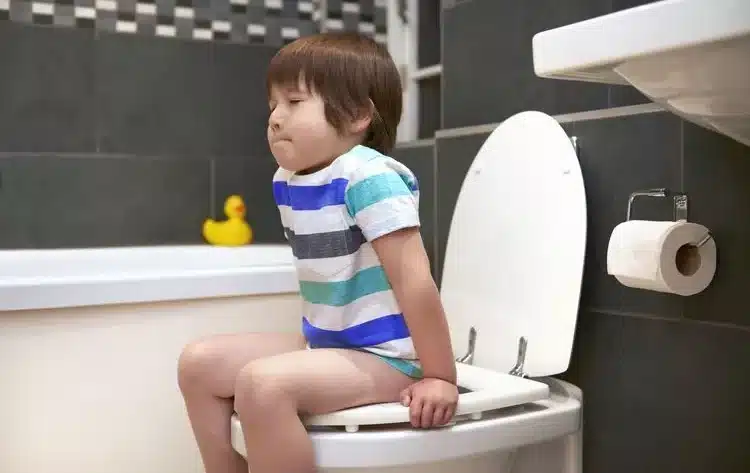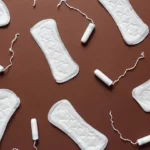Constipation In Children
Contents
In children or infants, constipation occurs when they have hard stools or problems passing stools. It is a widespread stomach issue.
A child may have pain while passing stools or may be unable to have a bowel movement after straining or pushing.
It is common in children, although constipation, and also causes pain and discomfort.
In the first month, infants tend to have bowel movements about once daily. after that, babies can go a few days or even a week between bowel movements.
1. Why It Occur?
There are many reasons of constipation:
- When the stool remains in the colon for a long time.
- Too much water gets absorbed by the colon, leaving hard, dry stools.
- Eating too much junk, fast, and processed food, which is high in sugar, fat, and low in fiber.
- Lack of water in the body
- Not being active in physical activity, (watching TV, playing online games), is one of the common reasons for constipation in children.
Learn – Benefits Of Drinking Enough Water.
Constipation in children may be caused by:
- Ignoring the urge to use the toilet
- Certain medicine’s side effects are also the reason
- Holding the poop inside, which happens for many reasons include:
- Too busy playing
- Don’t want to use public or school toilet
- An uncomfortable situation to tell their parents.
- Change in food or from breast milk to formula
- Travel, starting school, or streesful events
- Use of certain medicines
3. What is Encopresis?
Encopresis is the repeated passing of poop into their own clothing after the child reaches 4 years of age. and common in children between 4 to 8 years.
It is more common among boys than girls. and most cases of encopresis are the result of “chronic constipation” in children.
If you see this in your child, then talk to the doctor.
4. Symptoms and Signs
The symptoms of constipation live on a spectrum that can range from mild to severe. In severe include:
- Fecal impaction means – your child stool spends a longer time inside the colon.
- Soiling – means – For no reason, the stool comes in underwear.
Chronic constipation symptoms
- Abdominal pain
- Nausea
- Poor appetite
- Soiling or poo accidents
- Blood in the stool
- Bladder infections
However, normal bowel movements are different for each child.
NOTE: Signs of constipation in infants are more vital because they are not able to tell you, if your see these signs of constipation such as:
- Being very fussy and spitting up more often (infants)
- Difficulty passing stools or seeming uncomfortable hard, dry stools.
- Pain when having a bowel movement.
- Stomach pain and bloating
- Large, wide stools
- Blood on the stool or on toilet paper.
- Traces of liquid or stool in children’s underwear.
- Having less than 3 bowel movements a week (children)
5. Treatment of Constipation in Children
Treatment is based on the age of the child and how severe the problem is. usually, no special test is required.
Here are some home remedies, for children, toddlers, and certain medicines they include:
Home-remedies for Toddlers
Drink plenty of water
Drinking water is also helpful in adult constipation and it is one of the common reasons for constipation.
Give your baby extra water or juice during the day in between feedings. over 2 months old baby try 2 to 4 ounces (5g to 118 ml) of fruit juice.
Add more fibre in diet
If the baby has started to eat solid foods, so give them baby foods with high-fibre content. include:
- Pears
- Apples
- plums
- Spinach
- peaches
Home-remedies for Children
- Avoiding certain food in children such as cheese, fast food, prepared, and processed foods, meat, and Ice cream.
- Eat more fruits and vegetables and food high in fibre, such as whole grains.
- Use Triphala powder, especially give it with milk at night
- Stop toilet training if your children become constipated. resume after the child is no longer constipated.
- Teach older children to use the toilet right after eating a meal.
- Encourage physical activity to help stimulate intestinal contractions and bowel movements.
Medical Treatment
If home remedies are not working, you can also take the help of medical treatment. but first consult to your doctor.
- Docusate sodium like Stool softeners may help in older children.
- Psyllium may also help add fluid and bulk to the stool.
- Gentle laxatives can help children to have regular bowel movements.
- Miralax a (electrolyte solution)
- Some kids need enema, but only under doctor’s vision or prescription.
These methods should be used only if fibre, fluids, and stool softeners, and make sure do not provide enough relief.
Do not give children laxatives, Miralax, or enemas without asking your doctor. They can recommend a safe dosage.
What About – Instant Relief
Massaging the abdomen in young children and infants may help, and stationary cycling.
You can also massage the anus with your finger, or gently insert a cotton swab.
It is safe and not painful for children. It can help in getting instant relief.
6. When To Talk To The Doctor?
Constipation in children is common, however, chronic constipation may lead to complications.
If you see these signs in your children, then you should talk to the doctor.
- If the constipation lasts longer than 2 weeks
- Fever
- Eating food, and take out immediately (infants)
- Not eating
- Complaining of stomach pain frequently
- Weight loss without reason
- Pain during bowel movement
- Blood in the stool
- Liquid or soft stool leaking out of the anus
- For no reason, the stool comes in underwear.
Do not be careless with children. if you notice any change in their behavior like:
- Irritability
- not eating food, any type of pain in the body, etc then definitely talk to the doctor (baby doctor)
7. Prevention Tips
Here is some prevention that is.
- Do not eat high fiber food such as cheese, fast food
- Drink plenty of water (1 liter a day), especially during constipation, and diarrhea.
- Encourage physical activity
- Children should eat high-fiber food
- The baby should be given solid food only after at least 6 months, not before that.
- Make sure children does not stop potty inside the colon.
- Kids should poop daily, especially after a meal
8. Complication
Complications of constipation in children include:
- The hard stool can irritate the anus or tear anal
- Painful during bowel movement, due to stored stool, which keeps getting hard and bigger in the colon.
- The child may also avoid a bowel movement because of the pain. this can make constipation more get worse.
- Bleeding, pain, due to a small tear in the anus.
Down Line
The baby should be given solid food only after at least 6 months, not before that.
If you notice any change in kid behaviour like irritability, not eating food, any type of pain in the body, etc then definitely talk to the baby doctor.
Encopresis is more common among boys than girls. and most cases of encopresis are the result of “chronic constipation” in children.


